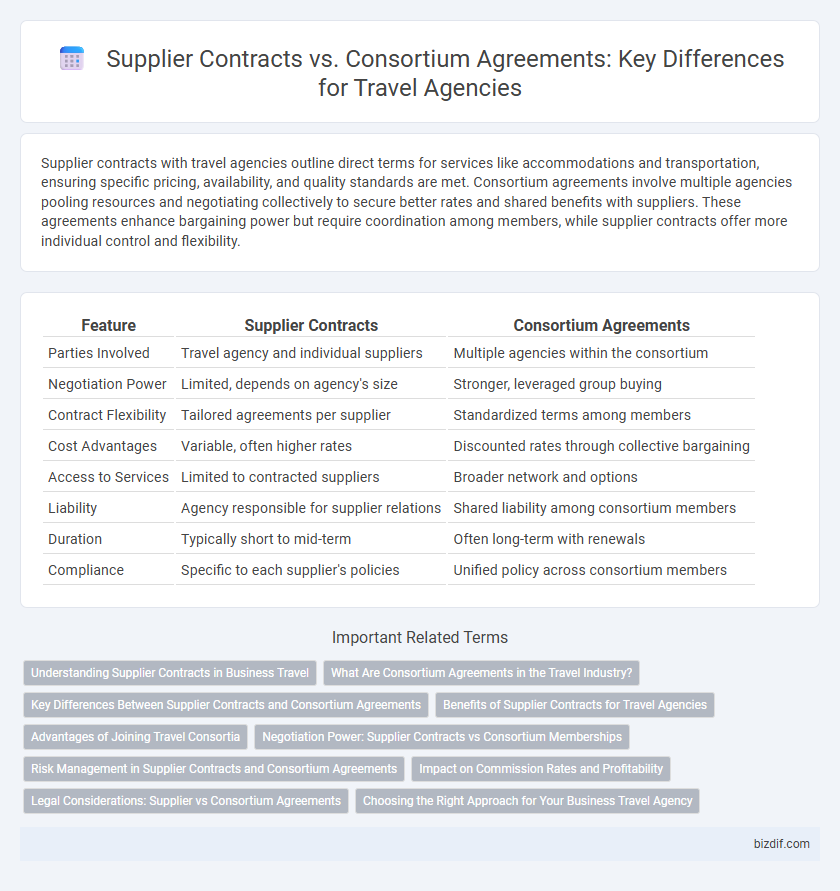Supplier contracts with travel agencies outline direct terms for services like accommodations and transportation, ensuring specific pricing, availability, and quality standards are met. Consortium agreements involve multiple agencies pooling resources and negotiating collectively to secure better rates and shared benefits with suppliers. These agreements enhance bargaining power but require coordination among members, while supplier contracts offer more individual control and flexibility.
Table of Comparison
| Feature | Supplier Contracts | Consortium Agreements |
|---|---|---|
| Parties Involved | Travel agency and individual suppliers | Multiple agencies within the consortium |
| Negotiation Power | Limited, depends on agency's size | Stronger, leveraged group buying |
| Contract Flexibility | Tailored agreements per supplier | Standardized terms among members |
| Cost Advantages | Variable, often higher rates | Discounted rates through collective bargaining |
| Access to Services | Limited to contracted suppliers | Broader network and options |
| Liability | Agency responsible for supplier relations | Shared liability among consortium members |
| Duration | Typically short to mid-term | Often long-term with renewals |
| Compliance | Specific to each supplier's policies | Unified policy across consortium members |
Understanding Supplier Contracts in Business Travel
Supplier contracts in business travel establish direct agreements between travel agencies and service providers such as airlines, hotels, and car rental companies to secure negotiated rates and exclusive deals. These contracts outline specific terms including pricing, payment conditions, cancellation policies, and service levels, ensuring consistent quality and cost control. Understanding the nuances of supplier contracts allows agencies to optimize procurement strategies and maintain strong partnerships critical to efficient travel management.
What Are Consortium Agreements in the Travel Industry?
Consortium agreements in the travel industry unify multiple travel agencies or suppliers to leverage collective buying power and streamline service offerings. These agreements enable members to access exclusive rates, joint marketing opportunities, and shared resources that individual supplier contracts may not provide. Consortium partnerships enhance competitive advantages by fostering collaboration, expanding product portfolios, and increasing negotiation leverage with hotels, airlines, and other travel service providers.
Key Differences Between Supplier Contracts and Consortium Agreements
Supplier contracts in travel agencies typically involve direct agreements with individual service providers, such as hotels or airlines, defining specific terms, pricing, and service levels for bookings. Consortium agreements, on the other hand, are collaborative arrangements among multiple travel agencies to leverage collective buying power, share marketing resources, and access exclusive deals. Key differences include the contractual parties, scope of collaboration, and the ability to negotiate bulk discounts or joint services, which are exclusive to consortium agreements.
Benefits of Supplier Contracts for Travel Agencies
Supplier contracts offer travel agencies direct access to exclusive rates, improved commission structures, and personalized service from hotels, airlines, and tour operators. These agreements enable agencies to tailor offerings precisely to their clients' needs while securing reliable availability and competitive pricing. Enhanced transparency and stronger negotiation leverage result in increased profitability and customer satisfaction for travel agencies.
Advantages of Joining Travel Consortia
Joining travel consortia offers travel agencies access to bulk purchasing power, resulting in lower costs and exclusive deals with global suppliers. Consortium agreements provide enhanced marketing support and advanced technology platforms that streamline booking processes and improve customer service. Membership in consortia strengthens competitive positioning by expanding product offerings and facilitating collaborative industry networking.
Negotiation Power: Supplier Contracts vs Consortium Memberships
Supplier contracts grant travel agencies direct negotiation power with individual service providers, allowing tailored terms for pricing, availability, and exclusivity based on volume commitments and relationship strength. Consortium memberships pool the collective buying power of multiple agencies, enhancing leverage to secure favorable rates and conditions that might be unattainable independently. While supplier contracts offer customized negotiation flexibility, consortium agreements provide amplified bargaining power through aggregated demand and shared market influence.
Risk Management in Supplier Contracts and Consortium Agreements
Supplier contracts in travel agencies typically include detailed clauses on liability, performance standards, and cancellation policies to mitigate risks such as service failures and financial losses. Consortium agreements involve shared responsibilities and joint liability among participating agencies, requiring clear mechanisms for risk allocation and dispute resolution to protect all members. Effective risk management in both contract types is essential to ensure accountability, minimize exposure to operational disruptions, and maintain compliance with industry regulations.
Impact on Commission Rates and Profitability
Supplier contracts typically offer fixed commission rates negotiated directly with service providers, allowing travel agencies to predict profitability more accurately and optimize margins. Consortium agreements often provide access to higher volume discounts and exclusive deals, enhancing commission potential but may require adherence to group policies that limit flexibility. Balancing direct supplier contracts with consortium memberships can strategically boost commission rates and overall agency profitability by leveraging both negotiated rates and collaborative purchasing power.
Legal Considerations: Supplier vs Consortium Agreements
Supplier contracts in travel agencies establish direct legal obligations between the agency and individual suppliers, detailing terms of service, payment schedules, and liability clauses essential for risk management. Consortium agreements create a shared legal framework among multiple agencies, outlining collective responsibilities, profit-sharing, and dispute resolution mechanisms that support cooperative business models. Understanding the differences in indemnity, termination rights, and compliance requirements is crucial for navigating legal risks and ensuring enforceability in either contractual arrangement.
Choosing the Right Approach for Your Business Travel Agency
Supplier contracts offer travel agencies direct control over pricing, service quality, and inventory, making them ideal for businesses seeking customized arrangements. Consortium agreements provide access to a broader network, shared resources, and collective bargaining power, which can lower costs and expand offerings. Evaluating your agency's size, negotiation capacity, and client needs ensures selecting the most strategic agreement type for optimal profitability and service delivery.
Supplier contracts vs Consortium agreements Infographic

 bizdif.com
bizdif.com